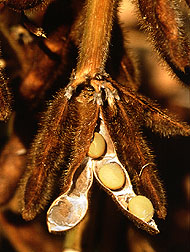This page has been archived and is being provided for reference purposes only. The page is no longer being updated, and therefore, links on the page may be invalid.
|
Read the magazine story to find out more. |
Soy Supplements Lead to Bone HealthBy Alfredo FloresApril 15, 2004 An Agricultural Research Service nutritionist in Houston, Texas, is leading a $4.5 million national study to answer important questions regarding osteoporosis, the thinning of the bones that leads to increased risk of bone fracture, a problem that affects some 20 million American women. Postmenopausal women are particularly susceptible because their estrogen production has greatly diminished. Estrogen plays an important role in slowing bone loss. Therefore, after menopause, bone loss can increase dramatically, and estrogen replacement therapy may be considered. Estrogen replacement therapy has been shown to reduce bone loss and fractures, but it carries some health risks. As an alternative, taking over-the-counter soy isoflavone supplements is becoming common among postmenopausal women. However, there is no documented scientific evidence of either their long-term safety or efficacy in preventing osteoporosis. To help answer this question, William W. Wong, based at the Children's Nutrition Research Center (CNRC) at Baylor College of Medicine in Houston, is leading a national study called OPUS, for "Osteoporosis Prevention Using Soy." The study will determine the benefits, safety and correct dosages of soy isoflavone supplements to prevent osteoporosis in postmenopausal women. The two-year project began in the spring of 2003. It eventually will involve 400 female volunteers divided between the CNRC in Houston, the University of Georgia at Athens, the University of California at Davis and the Kaiser Foundation Research Institute in Oakland, Calif. The CNRC is the coordination center, and Wong is the project director. OPUS will attempt to determine whether natural soy isoflavones really are beneficial and safe. One-third of the women will receive 80 milligrams (mg) of isoflavone supplementation per day, one-third will receive 120 mg per day, and the remaining one-third will receive a placebo. Read more about the research in the April issue of Agricultural Research magazine. The CNRC is operated by Baylor College of Medicine, in cooperation with Texas Children's Hospital and ARS. ARS is the U.S. Department of Agriculture's chief scientific research agency. |

